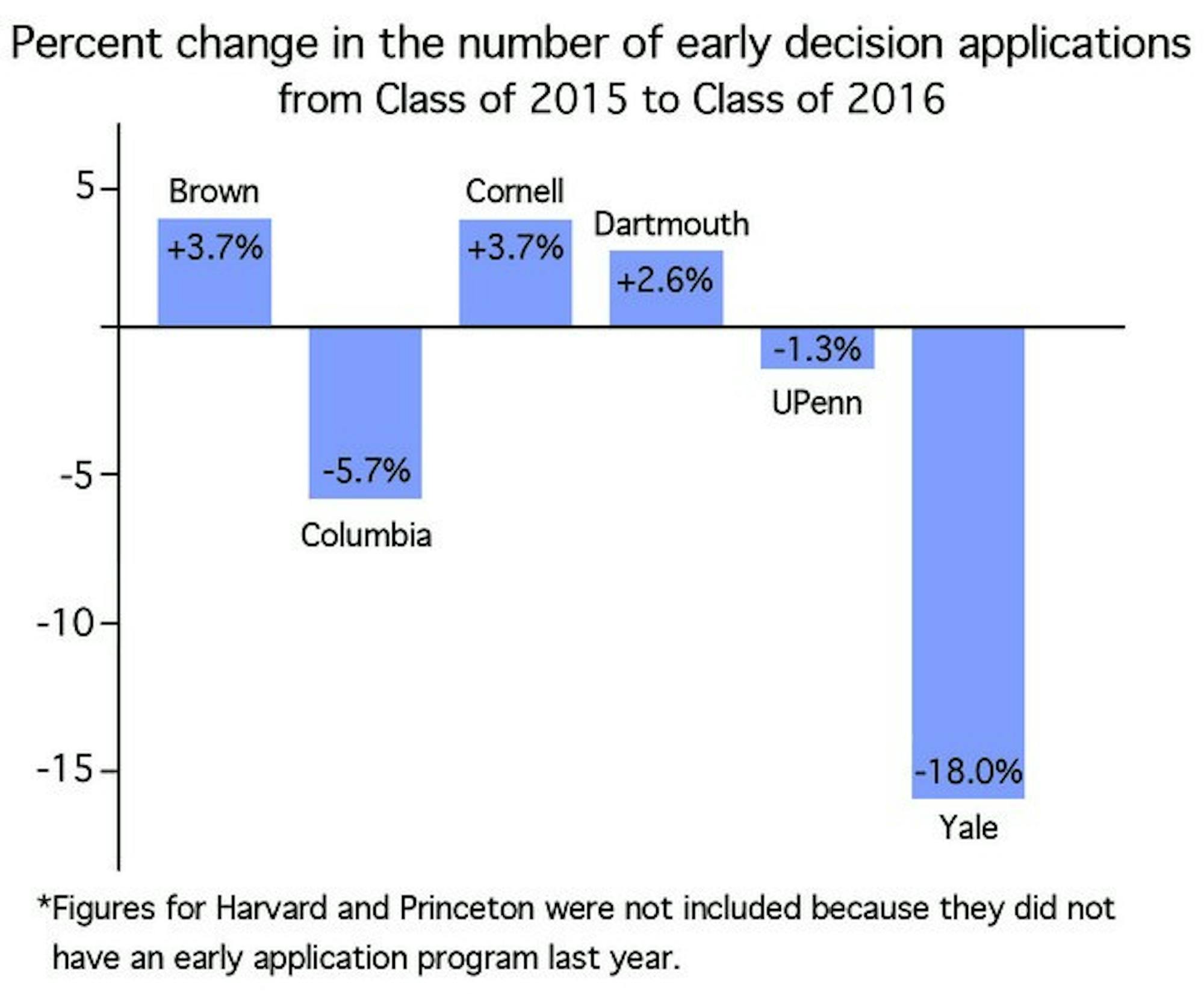Harvard and Princeton reinstated their early action options for the 2011-2012 application year after eliminating those programs in 2006.
"When Harvard and Princeton do something, it causes huge changes," Michele Hernandez '89 said in an interview with The Dartmouth. Hernandez, a former Dartmouth admissions officer, is the president of Hernandez College Consulting.
Harvard and Princeton's reintroduction of early admissions marked the "clearest change" to the College's early admissions process since last year, according to Laskaris.
"My sense is that some students who may have been early at Dartmouth in a prior year thought, Since [the Harvard and Princeton early action programs] are an option, let me give that a try, and if it doesn't work out apply to other schools later on,'" Laskaris said in an interview with The Dartmouth.
The percent change for Dartmouth's early decision applicants from year to year is "not surprising," Hernandez said. Although the College experienced a 2.6 percent increase in early applications in the 2011 cycle, there was a 12 percent increase from the Class of 2014 to the Class of 2015 early decision applicants.
"Applicants are now spread over more schools, with Harvard and Princeton," she said. "The numbers are stabilizing but are still historically the highest. They can't go up much more."
At the College's peer institutions, early admissions processes saw trends that experts attributed to Harvard and Princeton's decision to reinstate their early admissions programs.
Princeton received 3,547 applications in its single-choice early action program this year, a figure that was significantly larger than Princeton's previous early decision pools, according to The Daily Princetonian. Princeton's last early decision pool was in 2006 with 2,275 applications.
Harvard received 4,245 early applications for the Class of 2016, representing a 5.9-percent increase from the number of students who applied early action to the university when the early program was last in effect, The Harvard Crimson reported.
Yale received 4,310 early applications this year, marking an 18-percent decrease from last year's early pool. Yale Dean of Admissions Jeffrey Brenzel attributed this drop to Harvard and Princeton's revival of early action, The Yale Daily News reported.
The University of Pennsylvania received 4,510 early decisions applicants this fall, a decline of 1.3 percent from last year, The Daily Pennsylvanian reported. Penn Dean of Admissions Eric Furda cited the decline of the university's early decision pool to the return of Princeton and Harvard's early action programs, as well as general lack of knowledge about the institution and the school's costs, The Daily Pennsylvanian reported.
Columbia University also experienced a 5.7-percent decline in early decision applications.
At Brown University, Dean of Admissions Jim Miller said he expects the applicant pool to increase in the upcoming years as it has over the past five years, The Brown Daily Herald reported. This year, Brown received 2,900 early decision applications, a 4-percent increase from last year's early decision total of 2,796.
Cornell experienced a rise in early decision applications by 3.7 percent from last year, The New York Times reported.
Richard Kahlenberg, a senior fellow who writes about education at the Washington, D.C., think tank Century Foundation described Harvard and Princeton's revival of early admissions as "disappointing."
"It's an indication that competitive pressures won out over social justice concerns," Kahlenberg said in an email to The Dartmouth.
Kahlenberg, who said he opposed early admissions because "it advantages wealthier students," expects early admit programs to continue to gain popularity given increasing selectivity at colleges.
"The trend is troublesome, however, because it undercuts the efforts of universities to be more socioeconomically diverse," Kahlenberg said.
Stephen Trachtenberg, president emeritus and public service professor at George Washington University, said early admissions does not hurt financial aid students because schools want to balance equities and yearn for "a cosmopolitan mix."
Laskaris attributed Dartmouth's recent rise in early applications to the College's increased outreach efforts through "a whole variety of avenues." Early admission programs appeal to students who find completing applications earlier in the year to be stressful, she said.
The "continued volatility in the national and global economic picture," however, may make students less likely to apply to the College during the early decision round. Dartmouth's early admissions program is binding and therefore does not allow families applying for financial aid to choose from a variety of packages offered by other universities.
Hernandez said that as long as acceptance rates are larger for early decision applicants, early programs will continue to be popular.
Admission officials at Princeton University, Columbia University, Harvard University and the University of Pennsylvania declined to comment for this article. Cornell University, Yale University and Brown University were unable to comment by press time.




